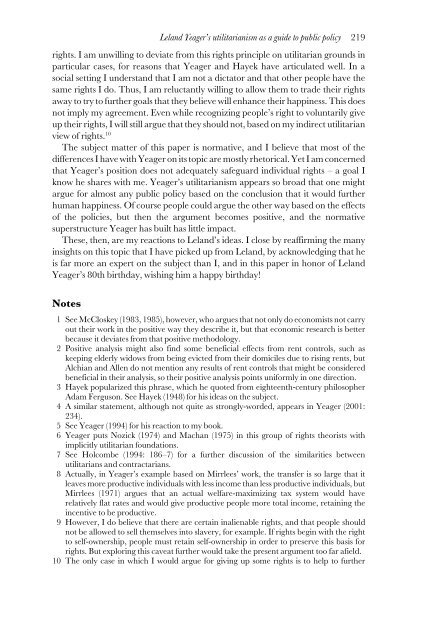Money and Markets: Essays in Honor of Leland B. Yeager
Money and Markets: Essays in Honor of Leland B. Yeager
Money and Markets: Essays in Honor of Leland B. Yeager
You also want an ePaper? Increase the reach of your titles
YUMPU automatically turns print PDFs into web optimized ePapers that Google loves.
Lel<strong>and</strong> <strong>Yeager</strong>’s utilitarianism as a guide to public policy 219rights. I am unwill<strong>in</strong>g to deviate from this rights pr<strong>in</strong>ciple on utilitarian grounds <strong>in</strong>particular cases, for reasons that <strong>Yeager</strong> <strong>and</strong> Hayek have articulated well. In asocial sett<strong>in</strong>g I underst<strong>and</strong> that I am not a dictator <strong>and</strong> that other people have thesame rights I do. Thus, I am reluctantly will<strong>in</strong>g to allow them to trade their rightsaway to try to further goals that they believe will enhance their happ<strong>in</strong>ess. This doesnot imply my agreement. Even while recogniz<strong>in</strong>g people’s right to voluntarily giveup their rights, I will still argue that they should not, based on my <strong>in</strong>direct utilitarianview <strong>of</strong> rights. 10The subject matter <strong>of</strong> this paper is normative, <strong>and</strong> I believe that most <strong>of</strong> thedifferences I have with <strong>Yeager</strong> on its topic are mostly rhetorical. Yet I am concernedthat <strong>Yeager</strong>’s position does not adequately safeguard <strong>in</strong>dividual rights – a goal Iknow he shares with me. <strong>Yeager</strong>’s utilitarianism appears so broad that one mightargue for almost any public policy based on the conclusion that it would furtherhuman happ<strong>in</strong>ess. Of course people could argue the other way based on the effects<strong>of</strong> the policies, but then the argument becomes positive, <strong>and</strong> the normativesuperstructure <strong>Yeager</strong> has built has little impact.These, then, are my reactions to Lel<strong>and</strong>’s ideas. I close by reaffirm<strong>in</strong>g the many<strong>in</strong>sights on this topic that I have picked up from Lel<strong>and</strong>, by acknowledg<strong>in</strong>g that heis far more an expert on the subject than I, <strong>and</strong> <strong>in</strong> this paper <strong>in</strong> honor <strong>of</strong> Lel<strong>and</strong><strong>Yeager</strong>’s 80th birthday, wish<strong>in</strong>g him a happy birthday!Notes1 See McCloskey (1983, 1985), however, who argues that not only do economists not carryout their work <strong>in</strong> the positive way they describe it, but that economic research is betterbecause it deviates from that positive methodology.2 Positive analysis might also f<strong>in</strong>d some beneficial effects from rent controls, such askeep<strong>in</strong>g elderly widows from be<strong>in</strong>g evicted from their domiciles due to ris<strong>in</strong>g rents, butAlchian <strong>and</strong> Allen do not mention any results <strong>of</strong> rent controls that might be consideredbeneficial <strong>in</strong> their analysis, so their positive analysis po<strong>in</strong>ts uniformly <strong>in</strong> one direction.3 Hayek popularized this phrase, which he quoted from eighteenth-century philosopherAdam Ferguson. See Hayek (1948) for his ideas on the subject.4 A similar statement, although not quite as strongly-worded, appears <strong>in</strong> <strong>Yeager</strong> (2001:234).5 See <strong>Yeager</strong> (1994) for his reaction to my book.6 <strong>Yeager</strong> puts Nozick (1974) <strong>and</strong> Machan (1975) <strong>in</strong> this group <strong>of</strong> rights theorists withimplicitly utilitarian foundations.7 See Holcombe (1994: 186–7) for a further discussion <strong>of</strong> the similarities betweenutilitarians <strong>and</strong> contractarians.8 Actually, <strong>in</strong> <strong>Yeager</strong>’s example based on Mirrlees’ work, the transfer is so large that itleaves more productive <strong>in</strong>dividuals with less <strong>in</strong>come than less productive <strong>in</strong>dividuals, butMirrlees (1971) argues that an actual welfare-maximiz<strong>in</strong>g tax system would haverelatively flat rates <strong>and</strong> would give productive people more total <strong>in</strong>come, reta<strong>in</strong><strong>in</strong>g the<strong>in</strong>centive to be productive.9 However, I do believe that there are certa<strong>in</strong> <strong>in</strong>alienable rights, <strong>and</strong> that people shouldnot be allowed to sell themselves <strong>in</strong>to slavery, for example. If rights beg<strong>in</strong> with the rightto self-ownership, people must reta<strong>in</strong> self-ownership <strong>in</strong> order to preserve this basis forrights. But explor<strong>in</strong>g this caveat further would take the present argument too far afield.10 The only case <strong>in</strong> which I would argue for giv<strong>in</strong>g up some rights is to help to further
















